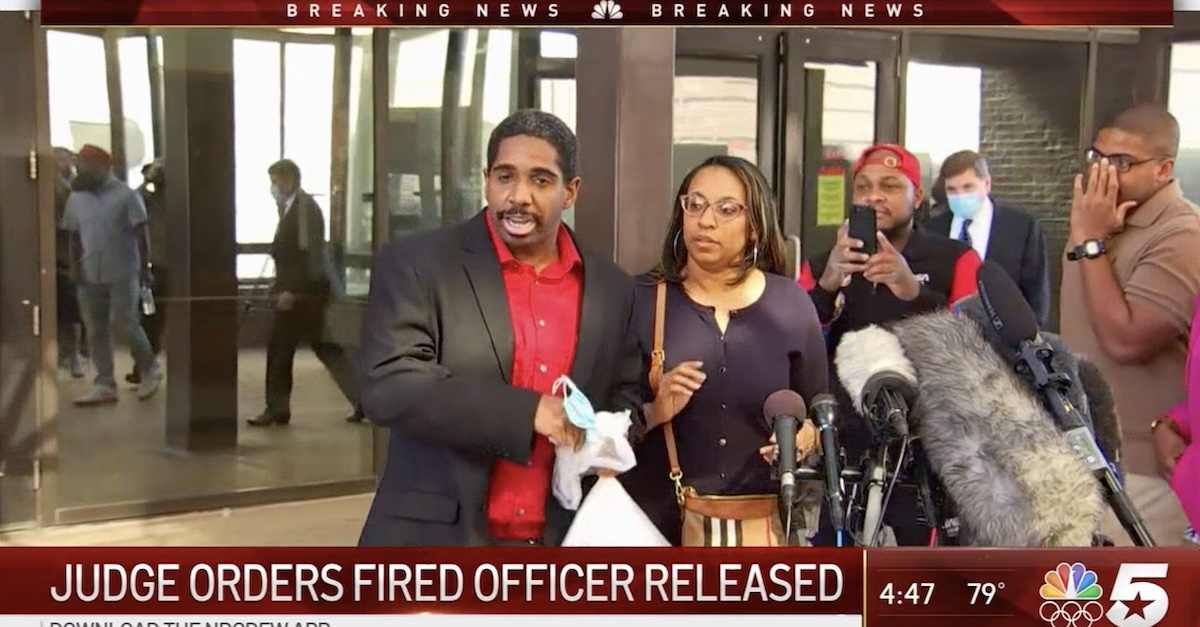
Bryan Riser after his release from jail in April
Two Texas men who earlier this year claimed that former Dallas Police Officer Bryan Riser paid them to kill a man—leading to Riser’s arrest and dismissal from the force—have been indicted for capital murder, local outlet NewsRadio 1080 reported Wednesday.
According to the report, Kevin Kidd, 32, and Emmanuel Kilpatrick, 34, both from Dallas, were indicted for the Feb. 25, 2017, murder of 61-year-old Albert Douglas.
Before the criminal case against him fell apart earlier this year, Riser was arrested in March and charged with two counts of capital murder. At least one of those counts was the direct result of Kilpatrick and Kidd telling law enforcement that Riser directed them to kill Douglas and 31-year-old Lisa Marie Saenz, then dump their bodies in the Trinity River as part of a murder-for-hire plot.
Riser’s attorney Toby Shook said the allegations against his client from Kidd and Kilpatrick should never have been believed in the first place.
Calling Kidd and Kilpatrick’s allegations “completely false,” Shook told NewsRadio “it was proven at the hearing that they are not credible in that regard.”
“They are guilty, and their admissions are true about their own involvement in that killing,” Shook added. “And I’m sure that they will then be prosecuted quickly by the DA’s office regarding that killing.”
Following Riser’s arrest, Dallas Police Chief Eddie Garcia said that witnesses had come forward and implicated the 13-year Dallas PD veteran in the murders, stating that both killings appeared to be personal in nature and not connected to any of Riser’s work with the department.
“No one hates a bad cop more than a good cop,” Garcia said in March, adding that Riser had “no business wearing that uniform.” Garcia fired Riser soon after an internal departmental investigation.
But the criminal case against Riser quickly evaporated. Among other things, the department admitted that it was incorrect when it said that cellphone data compiled by the FBI showed that Riser was near the site where both murders happened, and in April, a state judge and prosecutors agreed to drop the charges against him due to insufficient probable cause to move forward with the prosecution.
Riser, who had been behind bars for about a month, called out the Dallas Police Department for disrespecting and embarrassing him.
“This department I used to love and respect — they have disrespected me. They’ve embarrassed me and they’ve embarrassed my family all over make believe lies. I was 100% innocent from the get-go. I just want to go be with my family,” he said.
He also called the accusations by Kidd and Kilpatrick a “make-believe lie.”
Indeed, Riser had maintained his innocence all along. Those observing the case found it odd from the get-go that the Dallas Police Department would have allowed Riser to continue patrolling for more than a year while he was being investigated for murder. Police said that Riser was a “person of interest” in at least one of the killings dating back to 2019.
Chief Garcia said he was “disappointed” Riser’s charges were dismissed and vowed to continue investigating the case—but no new evidence has come to light, at least publicly, in the ensuing months to date.
Riser’s legal problems continued after his criminal case. The Dallas Morning News reported earlier this month on alarming testimony by his wife in a child-custody battle in May, alleging a pattern of violence.
“He told me that he would kill me if I were to take the children out of the Metroplex,’’ the ex-wife, whom the paper declined to name, reportedly testified in a May 20 court hearing. “I had no other choice. It was for my safety.’”
Riser denied those allegations, as well.
Matt Naham contributed to this report.
[image via NBC screengrab]